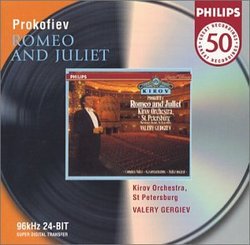| All Artists: Sergey Prokofiev, Valery Gergiev, St.Petersburg Kirov Orchestra Title: Prokofiev: Romeo and Juliet Members Wishing: 0 Total Copies: 0 Label: Philips Original Release Date: 1/1/1990 Re-Release Date: 3/13/2001 Album Type: Original recording remastered Genre: Classical Styles: Ballets & Dances, Ballets, Historical Periods, Modern, 20th, & 21st Century, Symphonies Number of Discs: 2 SwapaCD Credits: 2 UPC: 028946472620 |
Search - Sergey Prokofiev, Valery Gergiev, St.Petersburg Kirov Orchestra :: Prokofiev: Romeo and Juliet
 | Sergey Prokofiev, Valery Gergiev, St.Petersburg Kirov Orchestra Prokofiev: Romeo and Juliet Genre: Classical
|
Larger Image |
CD Details |
CD ReviewsThis is the one to get drollere | Sebastopol, CA United States | 01/31/2003 (5 out of 5 stars) "i've heard several recordings of prokofiev's most famous and most delightful ballet, and this is by far my favorite. unlike the usual "concert" approach to this score (maazel, ozawa, thomas), which emphasizes the dramatic narrative and treats the music as a massive tone poem, gergiev and his orchestra infuse the music with an irresistible dance energy, exactly as it would be played in a ballet performance. i often found myself tapping my foot or whistling along with the music, carried away by the spirit. the recorded sound is crisp and clear, and the orchestral playing is superb. absolutely enjoyable, start to finish. (a single cd release of excerpts from this two cd recording is also available from philips.)" A gem Kurt Randerath | Houston, TX United States | 01/07/2002 (5 out of 5 stars) "The number of great works of classical orchestra music diminished from the 18th to the 20th century. I would rate Prokofiev's Romeo and Juliet ballet music as one of the truly great musical works of the 20th century. This music is not difficult to listen to. It expresses every human experience and emotion: Joy and grief, love and hate, war and peace, tranquillity and catastrophy, life and death. The Kirov orchestra renders a stunning performance of this work, and Philips produced two exciting recordings. Excerpts of this recording are also available as a single CD from Philips. Busy listeners may prefer the single recording." An all-but-definitive Romeo and Juliet Santa Fe Listener | Santa Fe, NM USA | 03/12/2010 (5 out of 5 stars) "Valery Gergiev has in common with Bernstein that his charisma was recognized the moment he stepped on the podium, and it's no wonder that he became a superstar in the post-Soviet era. Having just reviewed Gergiev's recent Romeo and Juliet with the London Sym., I returned to this early version with the Kirov Orch. from 1990. Both are superlative, but the younger Gergiev had a more natural way with the score and was less prone to making a show piece of every number. Playing Prokofiev's complete ballet score was rare in the West. I attended a riveting performance by Gergiev and the Kirov, and the program notes said that the complete score had never before been played in Carnegie Hall.
What stands out about this reading is that Gergiev, an extremely intelligent thinker about the long line, handles the rise and fall of the ballet so that it doesn't peak too early, doesn't turn cloying, and never exhausts the listener (he's spoken to all these points in interviews, although the subject was Mahler). Each number is exciting, but it takes its place in a very satisfying overall scheme. No other reading that I know of is so successful on that front, not even Gergiev's remake. Prokofiev's music is scintillating, and it never lets up, but Gergiev balances the lesser climaxes with the greater ones. I apologize for sounding so abstract when the score is luscious, romantic, and swooningly gorgeous. Yet I think anyone who listens for it will notice how beautifully Gergiev has structured the performance. It's welcome in both his readings that he avoids vulgarity and luridness, always a temptation in this crowd-pleasing music. I used to complain that the sound from Philips, as recorded in St. Petersburg, was a bit rough and coarse. The latest remstering has taken care of that, but you won't mistake the recording as a sonic blockbuster. It doesn't need to be. On its own, this is an early indication that Gergiev deserves his superstar status." |

 Track Listings (25) - Disc #1
Track Listings (25) - Disc #1